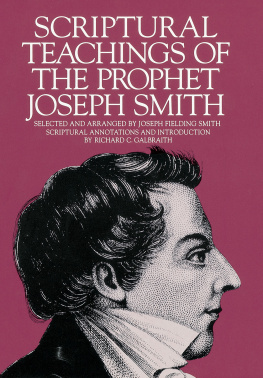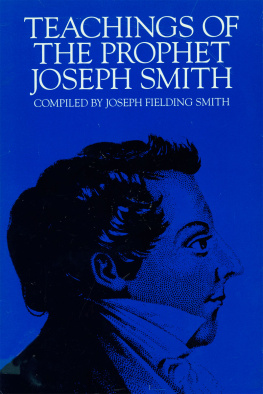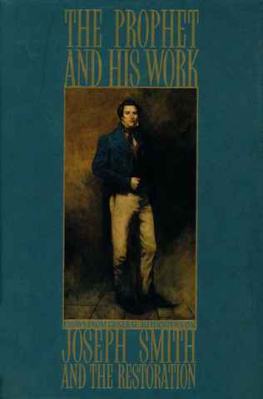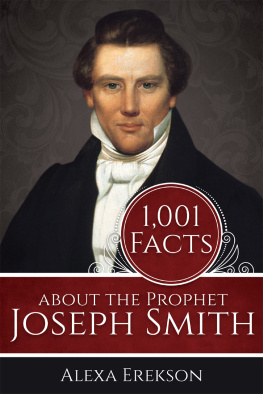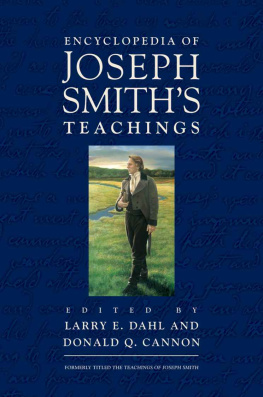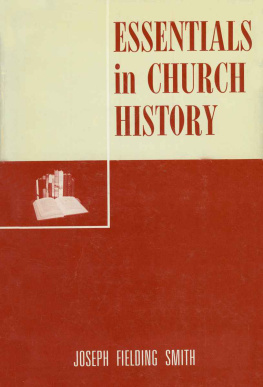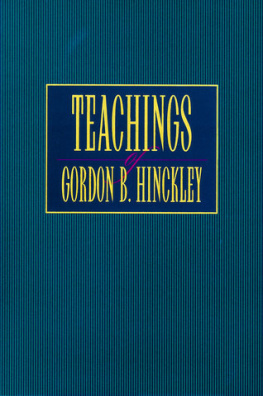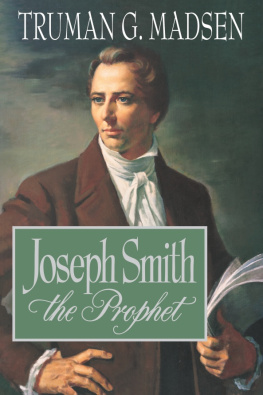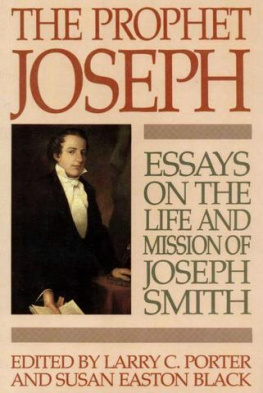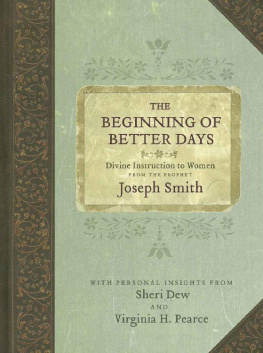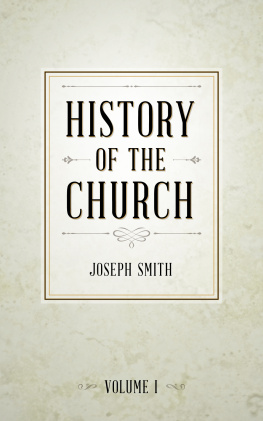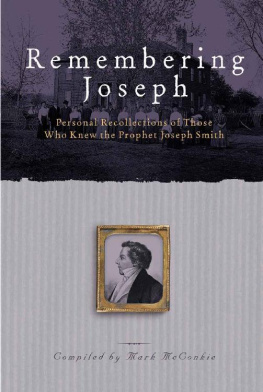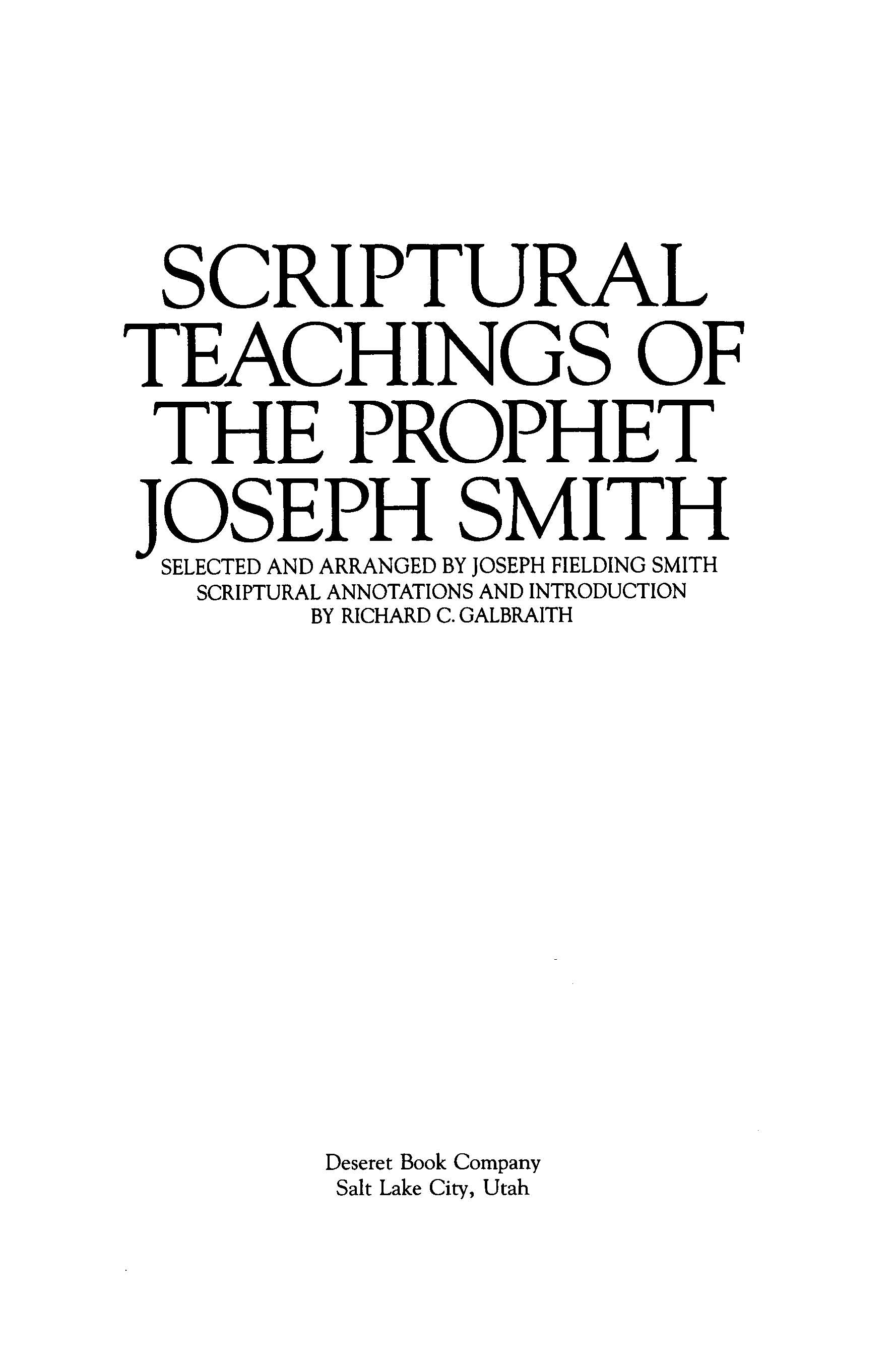1993 Deseret Book Company.
All rights reserved. No part of this book may be reproduced in any form or by any means without permission in writing from the publisher, Deseret Book Company, P.O. Box 30178, Salt Lake City Utah 30178. This work is not an official publication of The Church of Jesus Christ of Latter-day Saints. The views expressed herein are the responsibility of the author and do not necessarily represent the position of the Church or of Deseret Book. Deseret Book is a registered trademark of Deseret Book Company.
Library of Congress Cataloging-in-Publication Data
Smith, Joseph, 1805-1844.
Scriptural teachings of the prophet Joseph Smith / Joseph Smith, Jr. ; text selected and arranged by Joseph Fielding Smith; scriptural annotations and introduction by Richard C. Galbraith.
p. cm.
Rev. ed. of: Teachings of the prophet Joseph Smith. c1976.
Includes indexes.
ISBN 0-87579-647-8
1. Mormon ChurchDoctrines. I. Smith, Joseph Fielding, 1876-1972. II. Galbraith, Richard C. III. Smith, Joseph, 1805-1844. Teachings of the prophet Joseph Smith. IV. Title.
BX8621.S542 1993
289.32-dc20
92-41964
CIP
To my two scriptural grandmothers, Harriet Amanda Davis and Louise Oscarson Belnap
(2 Timothy 1:5)
PREFACE
I have had a fondness for the sermons and writings of the Prophet Joseph Smith for many years. My interest was initially sparked in the classes of Hyrum L. Andrus when I was an undergraduate student at Brigham Young University. I always appreciated the Prophets usage of the scriptures and would occasionally note a few scriptural references in the margins of my copy of Teachings of the Prophet Joseph Smith.
In November 1989, I decided it was time to formally catalog these marginal notes and hunt up what scriptural references remained. I contacted a friend in the Ancient Scripture Department, Monte S. Nyman, and asked if he had any scriptural references in his copy of Teachings which might save me a little time. Monte gave me a list containing seven hundred entries. I was sure the task was nearly done.
As with so many things, the little project began to take on a life of its own. My first careful reading of Teachings resulted in two thousand scriptural references. In addition, I discovered that many of the phrases and passages of Teachings, although not quoting verbatim, were extremely useful in the interpretation of many other scriptures, and vice versa. Several readings have transpired since, and the count now stands at more than eleven thousand references, both direct and contextual. Doubtless there are others.
I also found that the line between scripture cited and scriptural concept noted became increasingly blurred as my appreciation of the Prophets scriptural prowess grew. Once, when asked if he stole his wife, the Prophet replied, Ask her, she was of age, she can answer for herself (Teachings, p. 120). In a strict sense, that is not a scriptural citation. But after experiencing the Prophets scriptural genius time and again, I am persuaded that a witty use was made of John 9:21. In that passage, the parents of the man born blind, seeking to avoid excommunication (John 9:22), replied to the Pharisees, He is of age; ask him: he shall speak for himself.
A brief sampling of the Prophets scriptural usage, including a basis for this ability from his life experiences, is included in the introductory section entitled Joseph Smith and the Holy Scriptures. It is hoped that the present work highlights one of the great contributions of the Prophet Joseph Smith, that of expounding all scriptures unto the church (D&C 24:5).
The text of Scriptural Teachings of the Prophet Joseph Smith faithfully replicates that of the original Teachings compiled by Joseph Fielding Smith. Only four changesthree brief additions and one alterationhave been made to the 1976 edition. The three additions are passages from the same letters and sermons drawn upon by Joseph Fielding Smith. They have been included because they show scriptures used by the Prophet and highlight his encouragement to Latter-day Saints to study the writings of the apostles and prophets.
In the first example, Joseph was urging the Saints in Missouri to retain their property rights to the land of Zion despite the threats of imminent mob violence. In Scriptural Teachings, I have reinstated one sentence preceding the text of the edited letter to Bishop Edward Partridge dated December 5, 1833 (Teachings, p. 31): We can only say, that the destinies of all people are in the hands of a just God, and He will do no injustice to any one; and this one thing is sure, that they who will live godly in Christ Jesus, shall suffer persecution; and before their robes are made white in the blood of the Lamb, it is to be expected, according to John the Revelator, they will pass through great tribulation (History of the Church, 1:448). The Prophet alluded to 2 Timothy 3:12 and Revelation 7:14 as a reminder that persecution is the heritage of the Saints in the cause of Zion.
The second addition occurs just before the Prophets vision of the celestial kingdom (Teachings, pp. 106-7). On the evening of January 21, 1836, in the Kirtland Temple, Father Joseph Smith anointed the head of the Prophet and sealed upon him the blessings of Moses, Abraham, Isaac, and Jacob (History of the Church, 2:380). Father Smith, Oliver Cowdery, Sidney Rigdon, and Frederick G. Williams then laid their hands upon Joseph and pronounced many prophecies and blessings. Scriptural Teachings includes the following sentence by the Prophet, recorded in History of the Church, 2:380: But as Paul said, so say I, let us come to visions and revelations. Just prior to the Prophets vision of the celestial kingdom (D&C 137), Joseph quotes Pauls words given just before that ancient apostles vision of the third heaven (2 Cor. 12:1).
The final addition highlights Josephs encouragement of Latter-day Saints to read and study the scriptures (Teachings, p. 288). An elderly member of the Church had confounded the sectarians of the day with an incorrect interpretation of one of the beasts described by John the Revelator. Rather than censure the old gentleman, as did the Kirtland High Council, Joseph expressed his love and admiration for Brother Peletiah Brown and his initiative in defending the kingdom of God. Joseph continued: I did not like the old man being called up for erring in doctrine. It looks too much like the Methodists, and not like the Latter-day Saints. Methodists have creeds which a man must believe or be asked out of their church. I want the liberty of thinking and believing as I please. It feels so good not to be trammelled. It does not prove that a man is not a good man because he errs in doctrine (History of the Church, 5:340). Joseph then proceeded to teach the true interpretation of the figures and beasts contained in the writings of Daniel and John the Revelator.
The only textual change deals with one word in the June 16, 1844, sermon on the plurality of Gods. In History of the Church (6:474) and the 1938 edition of Teachings (p. 370), Joseph states: Paul says God was the Father of our Lord Jesus Christ. In the 1976 edition, John was substituted for Paul in this passage. I have returned to Paul because Paul states that God was the Father of our Lord Jesus Christ five times (Rom. 15:6; 2 Cor. 1:3; 11:31; Eph. 1:3; Col. 1:3); John never does.

